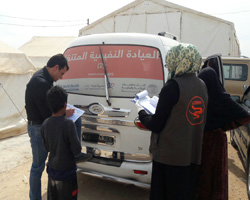Reaching out with mental health services for displaced Syrians

UOSSM
“The patient told me if he had a gun, he would commit suicide,” recalls Yasir*, a mental health professional working in war-torn north-western Syria. He was speaking with a divorced father of 3 who was distraught at the breakup of his family. “I said, ‘Why a gun?’ He answered, ‘The fast way is a gun. I would suffer with a knife.’”
Like many mental health care providers in Syria, Yasir faces difficult cases every day. Unlike his peers, though, his patients do not come to him. He goes to them, travelling in a WHO-supported mental health mobile clinic that visits villages, camps for displaced people, and other hard-to-reach places. “Internally displaced people are running from bombs. Post-traumatic stress disorder (PTSD) is common among them,” he says.
Yasir is a family doctor who was specially trained by WHO to provide first-line mental health services to people in north-western Syria. He completed training on WHO’s Mental Health Gap Action Programme (mhGAP) Intervention Guide, covering the diagnosis and treatment of psychoses, depression and other mental illnesses. Following the training, he joined the mobile clinic team run by WHO’s partner the Union of Medical Care and Relief Organizations (UOSSM).
“After 7 years of war, a large part of the Syrian population is suffering from mental health problems,” says Dr Annette Heinzelmann, Emergency Coordinator at the WHO field office in Gaziantep, Turkey. The office provides a broad range of cross-border health services to people in north-western Syria, as part of WHO’s “Whole of Syria” approach. “Mental health is a priority. This is why WHO supports health partners to provide quality mental health services to help Syrians heal the inner scars of war.”
Mental health mobile clinics go where there is need
With support from WHO, UOSSM runs a fixed-site mental health centre treating patients with acute mental health problems in north-western Syria. But “You can’t just sit and wait for people to come to you. You should reach out to people,” says Samir*, a Syrian psychologist who works for UOSSM across the border in Turkey. “Sometimes there’s stigma. Sometimes [people] are not familiar with mental health services, they don’t know they can be helped.” Materials are developed by WHO and distributed by UOSSM to raise their awareness.
The need to proactively reach out to mental health patients is the driving force behind the WHO-supported mental health mobile clinics. “Mobile clinics bring mental health services closer to the community. This makes a big difference, because it means allowing the most vulnerable, such as children, the elderly, pregnant women and lactating mothers, or people with disabilities, to receive mental health support,” says Dr Manuel de Lara, a mental health expert with WHO/Europe in Gaziantep. Without the mobile clinics, many of these people would have no access to such support.
Between October 2017, when 2 mental health mobile clinics started their activities, and March 2018, internally displaced people in northern Syria benefited from over 830 mental health consultations and nearly 5000 mental health awareness-raising activities on psychosocial support. As of April 2018, the mobile clinics were serving an estimated population of about 162 000 internally displaced people. Two additional mental health mobile clinics will be operational as of June 2018, making it possible to cover new areas.
One of the mobile clinics was visiting a camp for internally displaced people on the day Yasir met the suicidal man. “I asked him every single detail about his sleep, daily life, general feelings,” says Yasir. “He had lost hope in life. He feels all doors are closed.” Patients suffering from this kind of severe depression require close follow-up and supervision. After referring the man to the UOSSM mental health centre, Yasir hopes he will improve.
Providing support to bring back smiles
Psychosocial workers also visit schools and homes, often knocking door to door. “This is the front line, before the hospital psychiatrist,” says Samir. “There are a lot of mild and moderate cases. You can find depression, PTSD, anxiety disorders, selective mutism – where kids stop talking to strangers.”
During door-to-door visits, mental health professionals talk with residents to identify mental health problems and then provide counselling and support. Depending on patients’ needs, the team can prescribe medicine.
During one visit, Yasir’s team met a young Syrian woman suffering from nightmares, hallucinations and other symptoms of severe anxiety. “What we learned in mhGAP training is to encourage her to adapt to her new life and return to routine activities,” says Yasir. “Her mental situation has changed a little after our visit. She was not smiling at all, but now she is. She started to help her mother with housework.”
UOSSM’s mental health staff also provides special services for children, including those who have witnessed traumatic events. “There are children who are not eating well because of psychological problems. Children have nightmares,” says Samir. UOSSM’s community workers follow WHO guidelines in developing treatment plans for them.
Working with partners to deliver mental health services
The WHO field office in Gaziantep builds capacity in mental health and psychosocial support, develops materials to inform the population and raise awareness of mental health issues, and supports partners in providing consultations. Starting in May 2018, 60 psychosocial workers from partner nongovernmental organizations will learn how to provide mental health support during a 6-month WHO training that includes clinical supervision and support.
The mental health mobile clinics are funded by the Government of Japan. WHO’s capacity-building activities on mental health and psychosocial support are supported by the United Kingdom’s Department for International Development (DFID).
*Names have been changed for security reasons.



